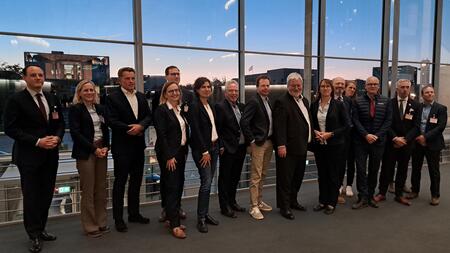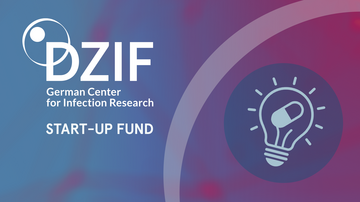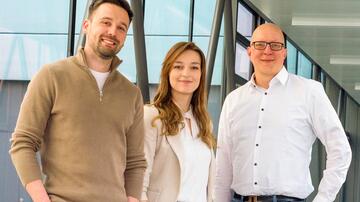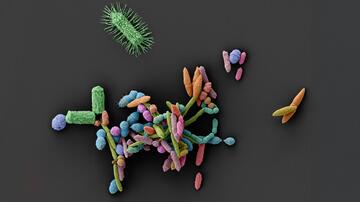Reconstitution of the Parliamentary Group against Antimicrobial Resistance
Participants in the reconstitution of the Parliamentary Group against Antimicrobial Resistance (PKAMR).
The Parliamentary Group against Antimicrobial Resistance (PKAMR) was reconstituted on Wednesday, September 24, 2025. It continues the work of the previous legislative period's parliamentary group. The PKAMR aims to raise awareness of this important issue in Germany and support the implementation of effective countermeasures.
We are pleased that Stephan Albani (CDU/CSU) and Franziska Kersten (SPD), both Members of the German Bundestag, have jointly taken over the PKAMR chairmanship. Other members include Jens Behrens (SPD), Simone Borchardt (CDU/CSU), Susanne Hierl (CDU/CSU), Sascha van Beek (CDU/CSU), Ophelia Nick (Bündnis 90/Die Grünen), and Dr. Maria-Lena Weiss (CDU/CSU).
Dr. Kersten welcomed the recognition of the issue's relevance to Germany and Europe in parliament during this legislative period. Research and development activities to combat AMR must be strengthened and supported by parliament.
Stephan Albani emphasized that antibiotics are a cornerstone of modern medicine. Without them, routine procedures such as appendectomies, joint replacements, and cancer treatments would pose enormous risks. However, the global increase in resistant pathogens is undermining this foundation. He made it clear that parliament, as the representative of the people, must urge the federal government to take decisive action. Even with responsible use, new resistances arise—a biologically unavoidable process. "That is why we need a continuous supply of new drugs and, ultimately, a concrete decision from the federal government," said Albani.
Prof. Jan Rybniker, Cologne University Hospital, deputy coordinator of the Tuberculosis research area the German Center for Infection Research (DZIF), as well as a member of the German Society for Infectious Diseases (DGI) and the German Network against Antimicrobial Resistance (DNAMR), described the dramatic situation in German hospitals: In the EU, 9,600 people die each year from resistance directly, and around 46,000 die from AMR-associated diseases. "Without effective countermeasures, we risk falling back to the days before the discovery of antibiotics," Rybniker emphasized.
Martin Heidecker, Chief Investment Officer of the AMR Action Fund, emphasized that the lack of innovation is primarily due to unfavorable market conditions. The market situation is particularly problematic for reserve antibiotics because they are only used in limited cases. Therefore, the quantities that can be sold do not allow the investments required for developing new antibiotics to be recouped. New incentive mechanisms are urgently needed. "Only around 100 companies worldwide are still working on clinical antibiotic development—a fraction compared to other therapeutic areas. Without targeted political measures, the research and development pipeline is in danger of drying up completely."
Dr. Timo Jäger, managing director of the German Center for Infection Research (DZIF) and spokesperson for the DNAMR, emphasized the importance of close cooperation between politics, research, and industry. "The reconstitution of the Parliamentary Group against Antimicrobial Resistance is an important signal that this issue is receiving the urgent political attention needed to safeguard our healthcare system," Jäger summarized.
- Key topics discussed
- Pull incentives for innovation: Developing new antibiotics is not enough. To maintain momentum, the federal government must take a clear position and introduce incentive systems. Other countries, such as Italy and the UK, are much further ahead in this regard.
- A problem specific to Germany is the inadequate reimbursement of reserve antibiotics in the inpatient sector.
Investing in AMR would strengthen Germany as a center of research and innovation, securing jobs and relieving the burden on the healthcare system in the long term. - Surveillance and monitoring: Germany has recently been unable to meet its EU reporting obligations. However, reliable data is necessary for the implementation of effective incentive systems.
- Preliminary findings on the environmental impact of antibiotic production are concerning. Higher environmental standards for production facilities are urgently needed to minimize wastewater contamination and reduce the risk of new resistances. Incentives for this must be discussed.
Conclusion: A sustainable incentive system is urgently needed at the European and national levels to encourage the research and development of new, resistance-breaking antibiotics. Germany could play a pioneering role in this area, ensuring national and European security of supply as well as global healthcare.
Source: Press release of the German Network against Antimicrobial Resistance (DNAMR)




